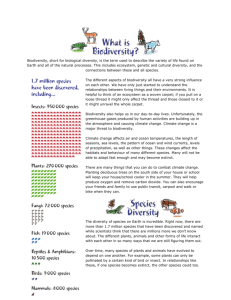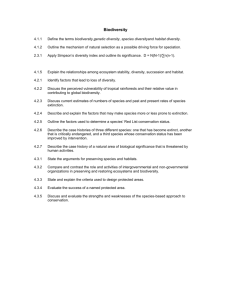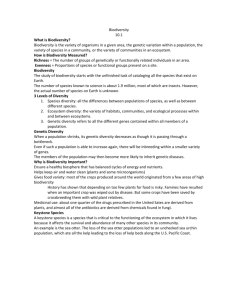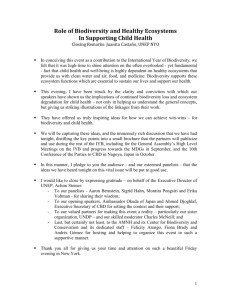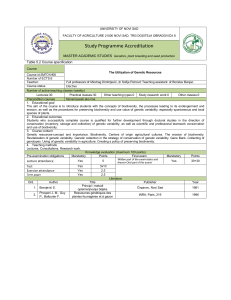English - Convention on Biological Diversity
advertisement
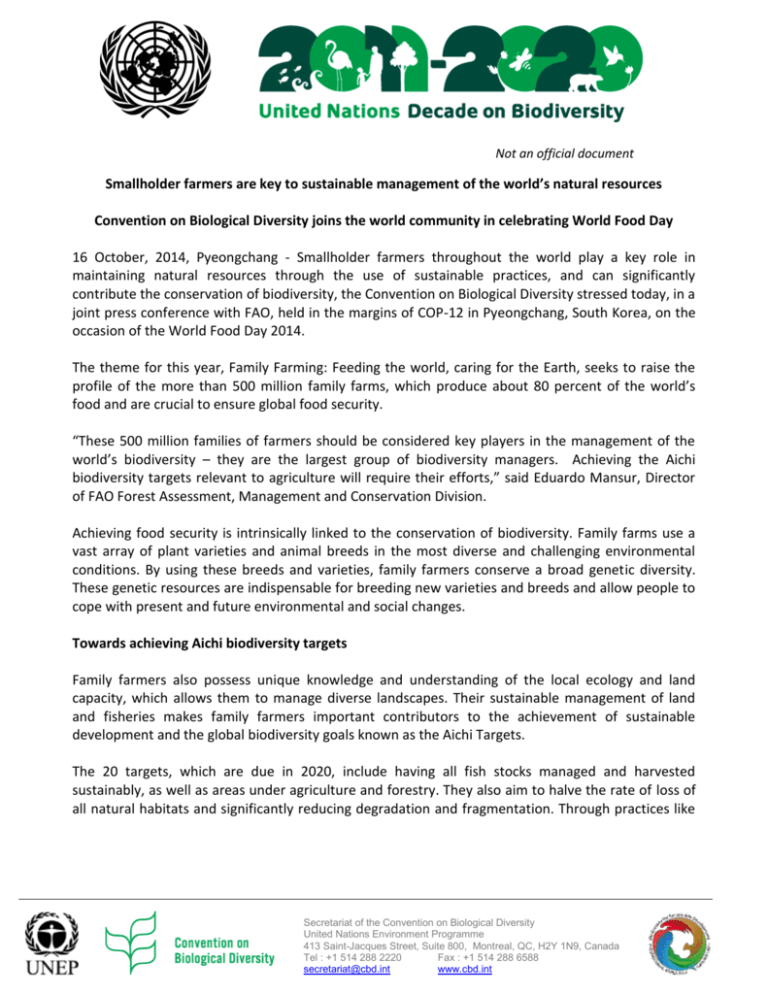
Not an official document Smallholder farmers are key to sustainable management of the world’s natural resources Convention on Biological Diversity joins the world community in celebrating World Food Day 16 October, 2014, Pyeongchang - Smallholder farmers throughout the world play a key role in maintaining natural resources through the use of sustainable practices, and can significantly contribute the conservation of biodiversity, the Convention on Biological Diversity stressed today, in a joint press conference with FAO, held in the margins of COP-12 in Pyeongchang, South Korea, on the occasion of the World Food Day 2014. The theme for this year, Family Farming: Feeding the world, caring for the Earth, seeks to raise the profile of the more than 500 million family farms, which produce about 80 percent of the world’s food and are crucial to ensure global food security. “These 500 million families of farmers should be considered key players in the management of the world’s biodiversity – they are the largest group of biodiversity managers. Achieving the Aichi biodiversity targets relevant to agriculture will require their efforts,” said Eduardo Mansur, Director of FAO Forest Assessment, Management and Conservation Division. Achieving food security is intrinsically linked to the conservation of biodiversity. Family farms use a vast array of plant varieties and animal breeds in the most diverse and challenging environmental conditions. By using these breeds and varieties, family farmers conserve a broad genetic diversity. These genetic resources are indispensable for breeding new varieties and breeds and allow people to cope with present and future environmental and social changes. Towards achieving Aichi biodiversity targets Family farmers also possess unique knowledge and understanding of the local ecology and land capacity, which allows them to manage diverse landscapes. Their sustainable management of land and fisheries makes family farmers important contributors to the achievement of sustainable development and the global biodiversity goals known as the Aichi Targets. The 20 targets, which are due in 2020, include having all fish stocks managed and harvested sustainably, as well as areas under agriculture and forestry. They also aim to halve the rate of loss of all natural habitats and significantly reducing degradation and fragmentation. Through practices like Secretariat of the Convention on Biological Diversity United Nations Environment Programme 413 Saint-Jacques Street, Suite 800, Montreal, QC, H2Y 1N9, Canada Tel : +1 514 288 2220 Fax : +1 514 288 6588 secretariat@cbd.int www.cbd.int crop rotation and using alternatives to chemical pesticides, family farmers prevent soil erosion and degradation of ecosystems. Sustainable farming practices also increase the resilience of ecosystems, thereby contributing to climate change mitigation and adaptation and to combating desertification. “Supporting the work of family farmers throughout the world would contribute substantially to eradicating poverty and to reaching global food security. These important stakeholders also have a role in implementing many of the Aichi Biodiversity Targets, such as contributing to developing and implementing sustainable agriculture, forestry and aquaculture practices, maintaining genetic resources for food and agriculture, to reduce the loss of natural habitats and others” said Braulio Ferreira de Souza Dias, the Executive Secretary of the Convention on Biological Diversity. Notes for Editors The Convention on Biological Diversity (CBD) Opened for signature at the Earth Summit in Rio de Janeiro in 1992, and entering into force in December 1993, the Convention on Biological Diversity is an international treaty for the conservation of biodiversity, the sustainable use of the components of biodiversity and the equitable sharing of the benefits derived from the use of genetic resources. With 194 Parties up to now, the Convention has near universal participation among countries. The Convention seeks to address all threats to biodiversity and ecosystem services, including threats from climate change, through scientific assessments, the development of tools, incentives and processes, the transfer of technologies and good practices and the full and active involvement of relevant stakeholders including indigenous and local communities, youth, NGOs, women and the business community. The Cartagena Protocol on Biosafety and Nagoya Protocol on Access and Benefit Sharing are supplementary agreements to the Convention. The Cartagena Protocol seeks to protect biological diversity from the potential risks posed by living modified organisms resulting from modern biotechnology. To date, 167 countries plus the European Union have ratified the Cartagena Protocol. The Nagoya Protocol aims at sharing the benefits arising from the utilization of genetic resources in a fair and equitable way, including by appropriate access to genetic resources and by appropriate transfer of relevant technologies. It entered into force on 12 October 2014 and has been ratified by 54 countries to date.For more information visit: www.cbd.int. For more information please contact David Ainsworth, Information Officer, Secretariat of the Convention on Biological Diversity at +82 (0)10 2149 0526 (until 17 October 2014) or at david.ainsworth@cbd.int Food and Agriculture Organization of the United Nations (FAO) The Food and Agriculture Organization of the United Nations (FAO) is a specialized agency of the United Nations that was established on 16th October 1945. Achieving food security for all is at the heart of FAO's efforts – to make sure people have regular access to enough high-quality food to lead active, healthy lives. FAO’s three main goals are: the eradication of hunger, food insecurity and malnutrition; the elimination of poverty and the driving forward of economic and social progress for all; and, the sustainable management and utilization of natural resources, including land, water, air, climate and genetic resources for the benefit of present and future generations. FAO has many intergovernmental processes and fora, one of them is the Commission on Genetic Resources for Food and Agriculture with its 178 member countries where global consensus can be reached on sectoral and cross-sectoral policies relevant to biodiversity for food and agriculture. Its main objectives are to ensure the conservation and sustainable use of genetic resources for food and agriculture, and the fair and equitable sharing of benefits derived from their use, for present and future generations. The Commission oversees and guides the preparation of periodic global assessments, such as the Report on the State of the World's Forest Genetic Resources launched in June 2014, as well as negotiates global action plans, codes of conduct and other instruments. For more information visit: www.fao.org. For more information please contact Irina Utkina, Media relations, FAO, at +39 06 570 52542 or at irina.utkina@fao.org

